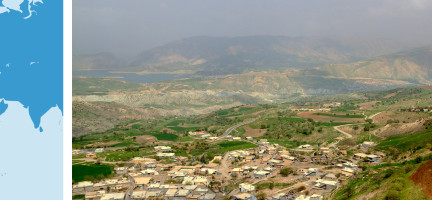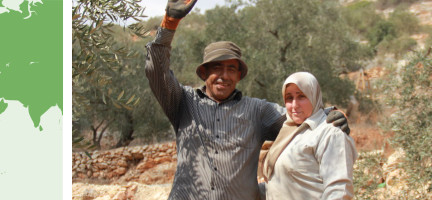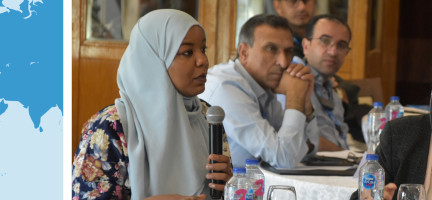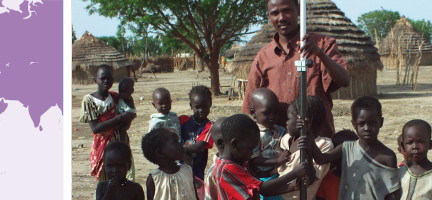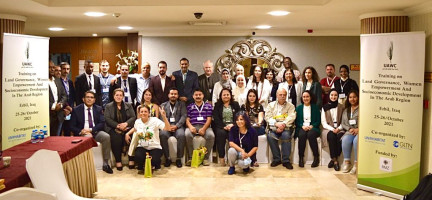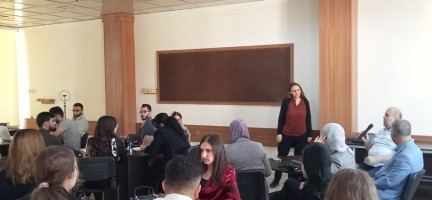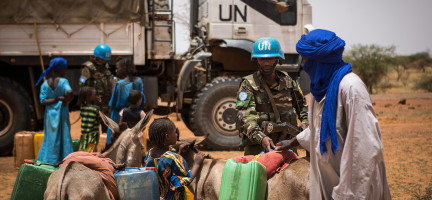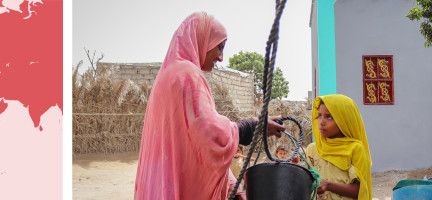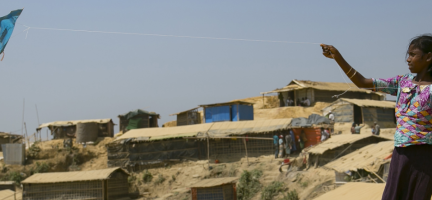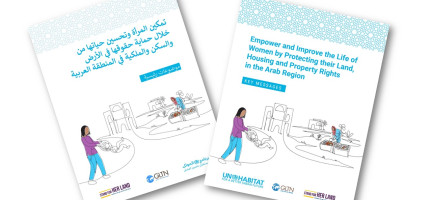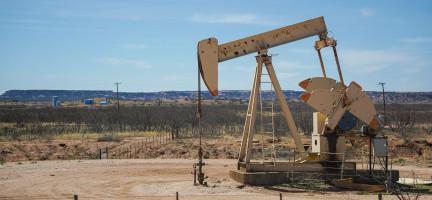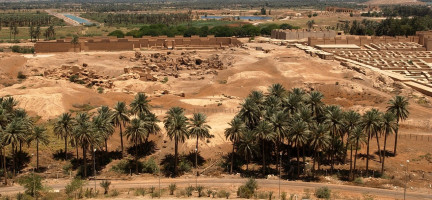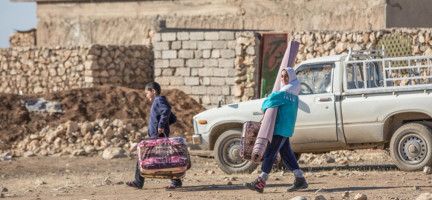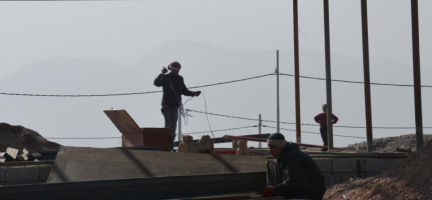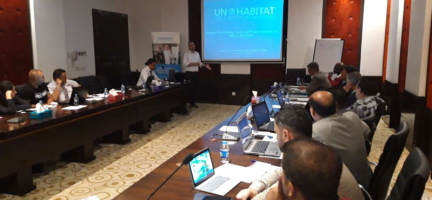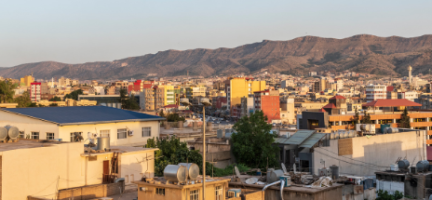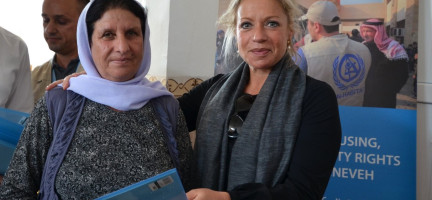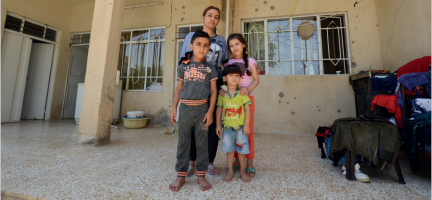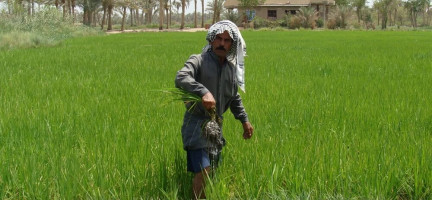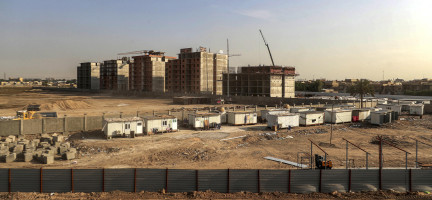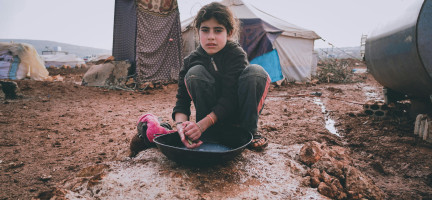العراق
العراق هو أحد بلدان أقصى شرق المنطقة العربية. يحدها من الشمال تركيا، ومن الشرق إيران، ومن الغرب سوريا والأردن، ومن الجنوب المملكة العربية السعودية والكويت.
يتمتع العراق بتاريخ فريد باعتباره "محركًا قويًا للنمو الاقتصادي الإقليمي والتجارة، ومنارة عالمية للثقافة والتعلم" (التقييم القطري المشترك 2009). وفي العقود الأخيرة، عانت من حربين خليجيتين متتاليتين، وعقوبات اقتصادية، وتدخل عسكري، وصراعات داخلية. لقد أثر عدم الاستقرار السياسي، والطبيعة المركزية لآليات الحكم، وعدم التوازن في تخصيص الموارد، ونقص الاستثمار في البنية التحتية والبيئة والخدمات الاجتماعية على قدرة البلد على تنمية اقتصاده ودعم احتياجات السكان (دروس الأمم المتحدة الإنمائية المستفادة التقييم 2011). تتأثر أنظمة الأراضي الحالية في العراق بشكل كبير بانعدام الأمن الاجتماعي والسياسي والموجات المتعددة من النزوح القسري على مدى السنوات الماضية، مما ساهم في انعدام الأمن في حيازة الأراضي والصراعات على استخدام الأراضي.
حيازة الأراضي
تتمتع إدارات حيازة الأراضي في العراق بأسس تاريخية عميقة، إلا أن أنظمة تسجيل وتسجيل الأراضي الحالية تتأثر بشكل كبير بالسياسات والأيديولوجيات المتضاربة التي تسيطر على برامجها وإصلاحاتها. كانت إدارة حيازة الأراضي العراقية، في كل من القطاعين الريفي والحضري، تحت تأثير هائل من السياسات والأيديولوجيات المتضاربة للدولة العراقية وحتى الحكم الديني الذي سيطر على برامجها وإصلاحاتها (الرشيد، 2005؛ موئل الأمم المتحدة، 2010ب). وتسببت هذه العوامل نفسها (ضعف الحوكمة) في نهاية المطاف في الشرعية الاجتماعية وانعدام الأمن القانوني لإدارات حيازة الأراضي (تقرير برنامج الأمم المتحدة للموئل، 2012؛ شايكلي، 2013). إن لتسجيل الأراضي وحقوق الملكية في العراق أسس تاريخية عميقة تعود إلى فترة حمورابي. ومع ذلك، فإن نظام تسجيل الأراضي الحالي يدين أكثر إلى الاحتلال العثماني للعراق الذي دام 400 عام والفترة اللاحقة تحت الانتداب البريطاني (الوكالة الأمريكية للتنمية الدولية، 2005).
قيمة الأرض
وتستند قيمة الأرض على المضاربة في السوق. لا يوجد نهج مؤسسي لتقييم الأراضي أو آلية مؤسسية لتحديد الأراضي، فهي تعتمد في الغالب على القوانين القديمة. يظل نظام إدارة الأراضي نظامًا مركزيًا. تتم إدارة تسجيل الأراضي محلياً، لكن فوائد هذا التسجيل لا تتحقق على المستوى المحلي. تقوم مصلحة الضرائب كل خمس سنوات بإصدار كتيب يتضمن تقدير قيمة الأراضي لاستخدامات الأراضي المختلفة (السكنية، الصناعية، التجارية).
تطوير الأراضي
تعرضت العديد من المحافظات في العراق لأضرار بالغة بسبب الصراعات. واستجابة لذلك، أطلقت وزارة التخطيط العراقية خطة إعادة إعمار وتنمية المدن العراقية المتضررة (2018 – 2022) بميزانية قدرها 100 مليار دولار أمريكي (UN-Habitat, 2018).
استخدام الأراضي
إن مشاركة المواطنين في قضايا استخدام الأراضي المحلية محدودة، كما أن تسجيل الأراضي لا يؤدي إلى زيادة الإيرادات المحلية من خلال الضرائب العقارية. قرارات استخدام الأراضي ليست كافية ولا يتم تنفيذها. ونظرًا لنظام تسجيل الأراضي الحالي، فمن الممكن أن يؤدي نقل السلطة إلى تمكين توليد الإيرادات المحلية ومراقبة المواطنين لاستخدام الأراضي (برنامج الحكم المحلي التابع للوكالة الأمريكية للتنمية الدولية في العراق، تسجيل الأراضي وحقوق الملكية في العراق، كانون الثاني/يناير 2005). ترتبط معظم التحديات التي تواجه إدارة استخدام الأراضي بنقص التوثيق والخطط القديمة خاصة في المناطق الريفية. إن غياب آليات الدولة لمراقبة وتنفيذ قرارات استخدام الأراضي هو نتيجة للوضع الاجتماعي والسياسي غير الآمن في العقود الماضية.
حل نزاعات الأراضي
لا توجد بيانات شاملة عن النزاعات على الأراضي في العراق ولا تنتج وزارة العدل في العراق إحصاءات عامة حسب نوع القضية مما يجعل من المستحيل تحديد وتيرة وأنواع النزاعات على الأراضي في العراق. يلعب القانون القبلي دورًا مهمًا جدًا في إدارة قضايا الأراضي والممتلكات، بما في ذلك حل النزاعات.
التركيز بشكل خاص: حماية الأدلة المتعلقة بحقوق السكن والأراضي والملكية للاجئين السوريين
منذ عام 2020، يعمل برنامج الأمم المتحدة للمستوطنات البشرية والشبكة العالمية لأدوات الأراضي بالشراكة مع GIZ في لبنان والعراق لتحسين أمن حيازة الأراضي وحماية حقوق السكن والأراضي والممتلكات للاجئين السوريين النازحين هناك.
وباستخدام أداة تسجيل الأراضي والممتلكات ومن خلال عملية تعداد تشاركية وطوعية صارمة، يوثق التدخل مطالبات اللاجئين السوريين بممتلكاتهم السكنية وغير السكنية في سوريا. وتشمل المطالبات الموثقة الملكية الكاملة، والملكية المشتركة، وحقوق الاستخدام طويلة وقصيرة الأجل. يتم قبول وحماية مجموعة واسعة من أنواع الأدلة المعترف بها قانونيًا والإضافية، بالإضافة إلى الوثائق الشخصية الداعمة. لا يتم التحقق من حقوق السكن والأرض والملكية التي يطالب بها المدعي، ولكن المعلومات التي تم جمعها يتم تخزينها بأمان في وحدات بيانات مخصصة لموئل الأمم المتحدة.
وكجزء من المشروع، يتم إصدار "شهادات جمع وحفظ وثائق علاقة الحيازة" من قبل موئل الأمم المتحدة. الشهادات ليست دليلاً على الملكية ولكنها تشهد على الإجراءات القانونية الواجبة المعتمدة التي قدم من خلالها المدعي مطالبته بالممتلكات الموصوفة في الشهادة والأدلة الداعمة ذات الصلة. يتم تسليم الشهادات إلى أصحاب المطالبات بدون أي رسوم ويمكن للمستفيدين استخدامها للحصول على معلومات حول ممتلكاتهم والأدلة الداعمة المرفقة.
تم تصميم هذا المشروع لدعم الجهود المستقبلية لاستعادة الممتلكات التي تم احتلالها أو التصرف فيها أو تدميرها بشكل غير قانوني أو المطالبة بالتعويض. ليس للمشاركة في المشروع أي تأثير على وضع المستفيدين في البلد أو إقامتهم أو عودتهم إلى سوريا. إضافة إلى جهات الاتصال الموجودة
التدخل الرئيسي
وقد أدى التعاون الناجح بين برنامج العراق التابع لموئل الأمم المتحدة والشبكة العالمية لأدوات الأراضي إلى تحسين المعرفة بشأن ممارسات الحيازة في المناطق الحضرية مع الحكومة والمجتمع المدني والجهات الفاعلة الدولية، مع الاعتراف بنهج "سلسلة الحقوق" لفقراء الحضر.
في إطار مشروع "دعم حقوق الإسكان والأرض والملكية للنازحين داخليًا في نينوى"، قدم برنامج الأمم المتحدة للمستوطنات البشرية في العراق، بالشراكة مع الشبكة العالمية لأدوات الأراضي، تدريبًا على إدارة الأراضي وقواعد البيانات الخاصة بإدارتها للنظراء المحليين حول نموذج مجال الحيازة الاجتماعية والدعم القانوني وتقديم المشورة بشأن القضايا المتعلقة بالأراضي والنزاعات.
علاوة على ذلك، في إطار مشروع "حقوق الإسكان والأراضي والممتلكات لليزيديين في منطقة سنجار، العراق"، تعمل GLTN بالتعاون الوثيق مع المكتب القطري لبرنامج الأمم المتحدة للمستوطنات البشرية في العراق لتسهيل العودة المستدامة للمجتمع اليزيدي إلى موطنهم الأصلي و الاعتراف بحقوق ملكيتهم.
Land dispute resolution
There is no comprehensive data on land disputes in Iraq and the Ministry of Justice does not produce public statistics by case type which makes it impossible to map the frequency and types of land disputes. The inaccessibility of the land information system (LIS) is problematic, particularly now when there is a great need to locate property and other identity documents within the government system and generate copies for claims purposes. This is made difficult by the centralized LIS in Baghdad. However, land disputes are mostly linked to displacement, dispute over tenure rights, and weak land governance. Some of these disputes can lead to violent conflicts, especially when there’s weak rule of law, others lead to land tenure insecurity and constrained use of land.
The Civil Code contains protections against coercion, fraud and deceit. Transfers of property made under such conditions are invalid, and any property sale outside the registry is considered null and void. Concerning land dispute resolution mechanisms, land disputes arising from land sale contracts, adverse possession, real estate renting, and property claims are regulated through the judicial system, including property claims arising out of the displacement of population after April 2003. The Civil Code deals with matters concerning inheritance rights and disputes related to religious law.
Alternative dispute resolution mechanisms
Recourse to alternative dispute resolution mechanisms (ADR) to resolve disputes including land disputes is not well developed in Iraq. Conversely, the role of tribal law is seen by Iraqi authorities as a viable alternative in managing land and property issues, including dispute resolution. Iraq’s history of fusing different forms of law is a clear advantage now where the State has limited reach in certain areas. In general, people prefer traditional (tribal) rather than formal systems of arbitration because of the high costs and slowness of the formal system. If disputes cannot be resolved in traditional ways, the concerned parties then resort to the modern court system. It would be worthwhile to explore the different ADR approaches already used by tribes and lineages that can be connected to statutory law in mutually supportive ways. This is important given that tribal disputes resolution mechanisms will be present in areas of return for IDPs[23]. The ADR needs to be incorporated more efficiently into the dispute resolution system[24].
Focus: Safeguarding evidence of housing, land and property rights of Syrian refugees
Since 2020, UN-Habitat and the Global Land Tool Network in partnership with GIZ have been working in Lebanon and Iraq to improve the land tenure security and safeguard the housing, land and property rights of Syrian refugees therein displaced.
Using a land and property recordation tool and through a rigorous participatory and voluntary enumeration process, the intervention documents Syrian refugees’ claims to their residential and non-residential properties in Syria. The claims documented include full ownership, joint ownership, long- and short-term use rights. A wide range of legally recognized and additional types of evidence are accepted and safeguarded, as well as supporting personal documentation. Verification of the housing, land and property rights claimed by the claimant is not undertaken, but the information collected is safely stored in dedicated data units of UN-Habitat.
As part of the project, ‘Certificates of Collection and Safeguarding of Tenure Relationship Documents’ are issued by UN-Habitat. The certificates are not proof of ownership but testify the adopted due process through which the claimant submitted his/her claim to the properties described in the certificate and the related supporting evidence. Certificates are handed over to the claimants at no fee and can be used by the beneficiaries to retrieve information about their properties and the supporting evidence enclosed.
This project is designed to support future efforts to re-possess properties illegally occupied, transacted or destroyed or to claim compensation. The participation in the project does not have any consequence on the beneficiaries’ status in the country or residence nor to their return to Syria.
Safeguarding evidence of housing, land and property rights of Syrian refugees
Since 2020, UN-Habitat and the Global Land Tool Network in partnership with GIZ have been working in Lebanon and Iraq to improve the land tenure security and safeguard the housing, land and property rights of Syrian refugees therein displaced.
Refugees are informed about the scope of the project and about how data is collected, handled and stored in accordance with the data protection protocol developed for this project. Refugees can opt out of the process at any time during the enumeration.
The claims documented include full ownership, joint ownership, long- and short-term use rights. A wide range of legally recognized and additional types of evidence are accepted and safeguarded, as well as supporting personal documentation. The information collected is safely stored in dedicated data units of UN-Habitat, accessible to authorized personnel only. Changes taking place after the date of claim registration are not recorded.
Verification of the housing, land and property rights claimed by the claimant is not undertaken. There is no adjudication of the ownership of the properties included in the enumeration, nor property documents are issued as a result of this project.
As part of the project, ‘Certificates of Collection and Safeguarding of Tenure Relationship Documents’ are issued by UN-Habitat. The certificates are not a proof of ownership but testify the adopted due process through which the claimant submitted his/her claim to the properties described in the certificate and the related supporting evidence. Certificates are handed over to the claimants at no fee and can be used by the beneficiaries to retrieve information about their properties and the supporting evidence enclosed.
This project is designed to support future efforts to re-possess properties illegally occupied, transacted or destroyed or to claim compensation. The participation in the project does not have any consequence on the beneficiaries’ status in the country or residence nor to their return to Syria.
How are certificates issued? STEP 1: Field Interviews Enumerators from UN-Habitat or its implementing partners conduct interviews with Syrian refugees currently displaced in Lebanon and Iraq and fill in the questionnaire using mobile tablets. The interviews are carried out through a voluntary and participatory process: refugees are informed about the scope of the project and about how data is collected, handled and stored in accordance with the data protection protocol developed for the project. The full data protection protocol is available for viewing to beneficiaries upon their request. The respondents can choose not to proceed with the enumeration at any point of the data collection process. The data collected include a wide range of tenure rights and supporting documents. In Iraq, enumerators conduct the data collection through door-to-door interviews. In Lebanon, Syrian refugees are invited to submit their claim at the community centres established by UN-Habitat for this project. For more information on the location of these community centres please refer to the contact information provided below. STEP2: Data archiving Digital copies of the information and evidence collected during the interviews are stored with UN-Habitat which is the data custodian for this project. Changes taking place after the date of claim registration are not recorded and a verification of the housing, land and property rights claimed by the claimants is not undertaken. STEP 3: Issuing the certificates Certificates of Collection and Safeguarding of Tenure Relationship Documents are issued and signed by UN-Habitat. Certificates testify the adopted due process through which the claimant documented his/her claim to the tenure relationship described in the document and the provision of supporting evidence. The certificates are not a proof of ownership. They are designed to help the claimant and his/her household to safely store his/her housing, land and property claims and supporting evidence in case of loss of these documents. STEP 4: Delivery of certificates Enumerators from UN-Habitat or its implementing partners hand over the certificates to the claimants at no fee through door-to-door visits, at the established UN-Habitat community centres, or in batches during specifically organized events. For more information on the location of UN-Habitat community centres in Lebanon and Iraq please refer to the contact information provided below. Know your rights The project team adopts a rigorous do-no-harm approach and ensures an inclusive and transparent process from the beginning of the project until the last phase. Any willing member of the identified communities can record his/her housing, land and property rights and claims to their properties in Syria – either individually, or as member of a household. The respondent can choose not to proceed with the process at any point of the data collection process. Concerns can be raised at any point with the field team. The Data Protection Protocol, which details the rights of the respondents, and the way data is collected and managed, is presented to the respondents before the start of the enumeration and it is available to be consulted upon request by requesting it from the field team. About UN-Habitat UN-Habitat is the agency of the United Nations working towards sustainable urbanization. It promotes socially and environmentally sustainable human settlements and adequate shelter for all. UN-Habitat has extensive country presence in the Arab states. Its country offices are located in Morocco, Tunisia, Egypt, Sudan, Lebanon, Palestine, Jordan, Iraq, Syria, Yemen, Kuwait and Saudi Arabia. For more information about UN-Habitat, please visit: www.unhabitat.org. The Global Land Tool Network (GLTN), hosted by UN-Habitat, is an alliance of international organizations committed to increasing access to land and tenure security for all, with special focus on the most vulnerable. GLTN works in close collaboration with UN-Habitat regional and country offices on themes related to land governance; land administration; housing, land and property rights; and land policy reforms. For more information about the Global Land Tool Network, please visit: www.gltn.net. At the regional level, UN-Habitat and GLTN manage the Arab Land Initiative, which focuses on improving good land governance and tenure security in the Arab region. For more information, visit https://arabstates.gltn.net/ |
To know more:
Brochure on Housing, Land and Property Rights for Syrian Refugees in Iraq
Or contact UN-Habitat Iraq: Website: www.unhabitat.org/iraq Email: info.iraq@unhabitat.org
Key interventions
The successful collaboration between UN-Habitat’s Iraq Programme and Global Land Tool Network (GLTN) has created improved knowledge on tenure practices in urban areas with the Government, civil society and international actors, recognizing a “continuum of rights” approach for the urban poor.
Under the project “Support to Housing, Land and Property Rights for IDPs in Nineveh,” UN-Habitat Iraq, in partnership with GLTN, provided training on land administration and management databases to local counterparts on the Social Tenure Domain Model (STDM) and legal support and advice on land- and conflict-related issues.
Further, under the “Housing, Land and Property Rights of Yazidis in Sinjar District, Iraq” project, UN-Habitat, with support from GLTN, facilitated the sustainable return of the Yazidi community to their original home and the recognition of their property rights through the implementation of a fit-for-purpose and a community-based approach land tool, the STDM.
On 27 December 2022, the Iraq government, under the leadership of its Prime Minister, Mr. Mohammed S. Al-Sudani, issued a decree to officially recognize the land ownership rights of the Yazidi communities, recognizing the occupancy records issued by UN-Habitat as full property titles.
UN-Habitat is currently working with partners on the modernization of the land and property registry and the accompanying legal and administrative review of the land sector.
تنصل
تعتمد المعلومات الواردة في هذه الصفحة على مجموعة المعرفة التي طورها برنامج الأمم المتحدة للمستوطنات البشرية وGLTN وشركاء مبادرة الأراضي العربية. التسميات المستخدمة وطريقة عرض المواد لا تعني التعبير عن أي رأي مهما كان من جانب الأمانة العامة للأمم المتحدة فيما يتعلق بالوضع القانوني لأي بلد أو إقليم أو مدينة أو منطقة، أو سلطاتها، أو فيما يتعلق بتعيين الحدود حدودها أو حدودها، أو فيما يتعلق بنظامها الاقتصادي أو درجة تطورها. قد تحتوي المعلومات على معلومات غير دقيقة بسبب مصدر (مصادر) البيانات ولا تعكس بالضرورة آراء موئل الأمم المتحدة أو هيئاته الإدارية.
صفحة العراق ما زالت قيد الإنشاء. شارك معنا بأي معلومات أو موارد أو تصحيحات ذات صلة لإثراء مكتبتنا. اتصل بمبادرة الأراضي العربية على unhabitat-arablandinitiative@un.org !
